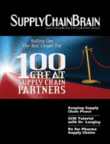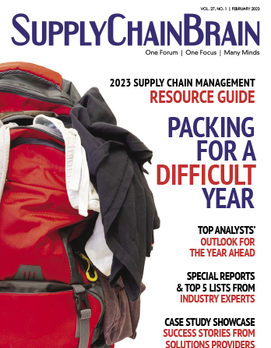
Home » Spectrum Chemicals Takes the Lid Off Growth
Spectrum Chemicals Takes the Lid Off Growth

August 9, 2012
Is there anything more frustrating for a supplier than the inability to handle success? It's the only thing worse than having no business at all.
Spectrum Chemicals and Laboratory Products sells a wide range of chemicals, lab supplies and equipment related to the making of pharmaceutical, personal care, cosmetic and food items. Universities, pharma companies and research labs make up the bulk of its customer base.
It's a complex operation by any measure. The company manufactures and distributes some 250,000 unique SKUs out of two manufacturing facilities, in Los Angeles, Calif., and the New Brunswick, N.J., headquarters. Items are made to exacting specifications and are strictly monitored by the U.S. Food and Drug Administration.
Spectrum has enjoyed a great deal of success in its 30-plus years of existence - too much, as it turned out. Thanks to a complex and highly manual fulfillment operation, its customer-service staff was limited to handling around 40 orders a day per person. An entire team of people was concerned solely with entering faxed and e-mailed orders into the enterprise resource planning system. Under that setup, there were no shortcuts to processing the shipment of sensitive, tightly regulated chemicals to destinations around the world.
Complications ensue from the wide variety of chemicals, which might be available in up to a dozen different grades. If a customer fails to specify the correct item number, it's up to Spectrum to steer it in the right direction. The extended interaction with accounts, necessary though it might have been, was slowing down the process and limiting the number of orders that could be addressed in a manually driven environment.
"We knew that as we were growing, we had to streamline the order-entry process," says director of e-business Larry Hilton. At the same time, "we need to make sure that all of the paperwork was correct."
Spectrum's first thought was to integrate its business-to-business communications and electronic data interchange (EDI) messaging with the help of internal resources. That idea was quickly rejected. The company didn't want to take on the cost of maintaining its own value-added network (VAN), an effort that would have necessitated the purchase of large blocks of data. What's more, a home-grown system was unlikely to scale easily in line with future growth. So Spectrum began searching for an external partner.
Spectrum Chooses Hubspan
Hubspan, a vendor of B2B integration technology in the cloud, was the company's ultimate choice. It was familiar to Spectrum through an existing partnership with SciQuest, a provider of electronic procurement software and services. "We did a lot of business with universities associated with that solution," says Hilton. "[Hubspan] became a natural to consider."
Jim Cantrell, director of channel programs with Hubspan, says SciQuest serves several hundred higher-education organizations. Hubspan acts as an integrator between the SciQuest platform and the spend-management programs of its users, including Spectrum. It also works with a number of other e-procurement offerings.
Hubspan interfaces directly with Spectrum's internal ERP system for all relevant order-to-cash transactions. The vendor links Spectrum with its universe of trading partners without the need for the latter to bring on additional IT staff.
Traditional VAN messaging relies mostly on the batch processing of documents and other communications between supplier and buyer. With the help of Hubspan, Spectrum is able to convey messages in a real-time environment, avoiding both delays as well as transactional fees.
In the first year of working with Hubspan, Spectrum discovered an opportunity to work more closely with trading partners that generated smaller volumes of product. Their requirements, says Hilton, were relatively straightforward and involved much less messaging. Hubspan was of help in negotiating new pricing agreements with that group, which has turned out to be a lucrative source of business for Spectrum as it achieves economies of scale.
Implementation was a relatively smooth process, aided by an outside contractor recommended by Hubspan. The vendor's own customer-service group was also "highly professional and helpful," says Hilton. Spectrum had allotted eight weeks in which to complete the initiative, but was able to wrap up work within six weeks.
How It Works
Under the current arrangement, customer orders flow to Hubspan in a variety of message formats, then are sent to Spectrum's ERP system via a Web-based gateway. "We never even touch them unless there's an issue with an incorrect part number," says Hilton. Errors pop up less than half of one percent of the time.
Orders then flow to Spectrum's picking area, where they are packed and readied for shipment. Upon completion of the fulfillment process, the system electronically invoices the customer. All of those processes used to be executed manually, Hilton notes.
The technology has allowed Spectrum both to reduce staff and reassign order-entry personnel to more valuable roles, especially customer service. On the regulatory compliance side, automation helps to ensure that customers' licenses and permits are in place and up to date. In all, says Hilton, Spectrum has been able to cut order-processing time, from receipt to shipment, by nearly 40 percent.
Looking ahead, Spectrum intends to expand its number of trading partners, taking advantage of the lower cost of order processing and shipment. As for Hubspan, Cantrell says it's looking to increase the types of business processes and transactions that it supports. The vendor hopes it can attract additional business as customers become more accustomed to reliance on the cloud for the automation of key business processes.
Resource Links:
Hubspan
Spectrum Chemicals
Keywords: supply chain, IT supply chain, supply chain management, inventory management, logistics management, warehouse management, supply chain planning, sourcing solutions, Spectrum Chemicals, Hubspan, SciQuest
RELATED CONTENT
RELATED VIDEOS
KEYWORDS Chemicals & Energy EDI Communication (XML/EDI) Global Trade Management Hubspan Inventory Management IT supply chain logistics management Ocean Transportation order fulfillment Pharmaceutical/Biotech Product Lifecycle Management Quality & Metrics Regulation & Compliance Sales & Operations Planning SC Finance & Revenue Management SC Planning & Optimization SC Security & Risk Mgmt SciQuest Sourcing Solutions Sourcing/Procurement/SCM Spectrum Chemicals supply chain Supply Chain Management Supply Chain Planning Supply Chain Visibility Technology Warehouse Management
Subscribe to our Daily Newsletter!
Timely, incisive articles delivered directly to your inbox.
Popular Stories

2023 Supply Chain Management Resource Guide: Packing for a Difficult Year
VIEW THE LATEST ISSUECase Studies
-
JLL Finds Perfect Warehouse Location, Leading to $15M Grant for Startup
-
Robots Speed Fulfillment to Help Apparel Company Scale for Growth
-
New Revenue for Cloud-Based TMS that Embeds Orderful’s Modern EDI Platform
-
Convenience Store Client Maximizes Profit and Improves Customer Service
-
A Digitally Native Footwear Brand Finds Rapid Fulfillment



